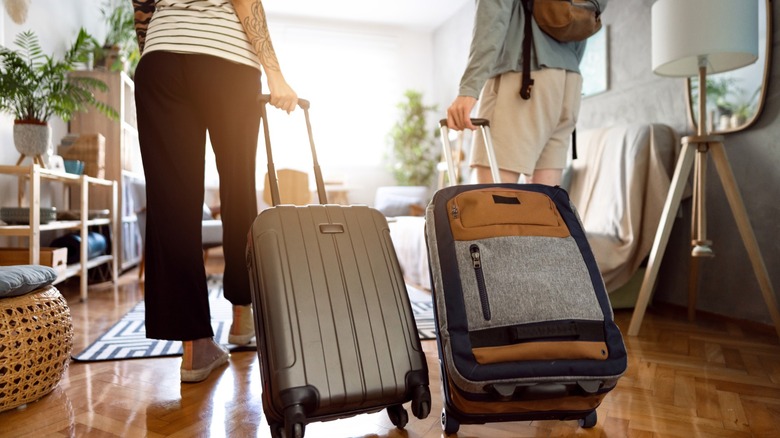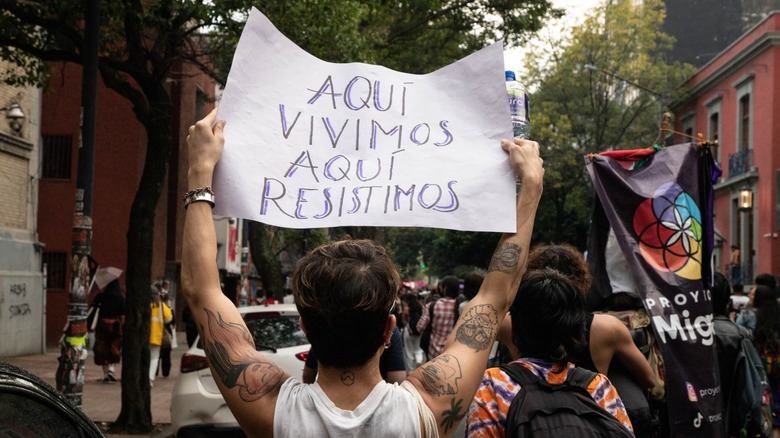
Let's face it: Most vacationers still choose Airbnb for their short-term stays. A survey by Skift showed that while the top three short-term booking platforms took the lion's share of the market in 2024,
Airbnb far outperformed its closest competitors -- Booking and Expedia. Unfortunately, this market dominance has led to a seller's market mentality among some property owners. You can see this in stays that lack adequate amenities, have inconveniently late check-in times (or early check-out times), or worse, don't match the pictures.
Luckily, there are some Airbnb red flags to watch out for to avoid encountering these less-than-desirable situations, and you can spot them just by sifting through reviews. A major red flag is when the reviews make no mention of the host by name or note any in-person interaction. After all, if there truly was an individual host, guests often point them out and note how helpful (or unhelpful) they were during the stay.
Other red flags include listings that only show close-up photos of items instead of entire rooms, as they can be a big indicator that something is being hidden. Descriptions or instructions written in all caps can also point to a rude or unreasonable host.
Read more: Simple Tricks To Getting Extra Perks When You Check Into Your Hotel
Why You Should Skip Big Company Airbnbs

Other clues that your booking is owned by a company include the absence of personal items in the accommodation. such as books or candles, no one to greet you, no neighbors, and no one to say farewell. According to Towards Data Science, three out of five Airbnb listings are owned by rental investors. Just because a listing is labeled an "individual host" doesn't necessarily mean it is one. Airbnb defines an individual host as anyone who doesn't use property management software, so a company can still be labeled as such while owning multiple properties. And if you're wondering why that matters, fewer personal touches and a lack of cleanliness can be associated with company-owned properties.
Horror stories have included stays with marijuana-strewn floors and rooms that smell like vomit. Even more alarming, Airbnbs aren't required to have safety equipment such as smoke detectors, carbon monoxide detectors, or fire extinguishers. That's not to mention the danger to your wallet, as Airbnb fees can be overwhelming on a travel budget. A NerdWallet analysis showed that cleaning fees can be up to 25% of the total booking price.
An overabundance of Airbnbs in cities can also have a severely negative impact on housing availability by removing units from the supply and raising rental prices. Per Motley Fool Money, some cities in the U.S. have seen up to a whopping 30% increase in rents. It's no wonder that locals in popular destinations like Mexico City have been protesting against Airbnb properties in their neighborhoods. In Barcelona, residents have resorted to squirting tourists with water guns. In some of Rick Steves's best travel tips, he suggests skipping Airbnb altogether by staying in family-run hotels or guesthouses.
Watch Out For Big-Company Owned Airbnb Scams

Locals in Barcelona have ways to avoid crowds while visiting their city, which can lessen annoyances for both visitors and residents. This helpful guidance is more than can be said for some company-owned Airbnbs, which have duped their renters with falsely advertised listings -- or worse. Some tales include London guests being placed in random properties that were, but not the same as, the homes they paid for.
In New York City, guests were tricked into paying for a glamping experience in the heart of the city, when in fact, the stays were a collection of RV vans parked on the street. The listings were hosted by a person named "Nancy," but there was no confirmation on whether the listing was owned by an individual host. Adding to the mystery, one guest told the New York Post that a parking ticket was on his van when he arrived. Some may argue that the scam could have been avoided, as the listing reportedly had very few reviews -- often a red flag for fraud on Airbnb.
These bait-and-switch tactics are just a few of the many Airbnb scams to watch for. Red flags for these include low prices for luxury listings, which often turn out to be budget accommodations disguised with photoshopped images or stock photos. Other red flags include misleading or vague descriptions of the property or location, sometimes accompanied by bogus addresses. Another common scam involves requests to pay outside the platform, which raises the risk of theft. To avoid being scammed, ask the host questions before booking and keep all transactions and correspondence on Airbnb.
Ready to discover more hidden gems and expert travel tips? Subscribe to our free newsletter for access to the world's best-kept travel secrets.
Read the original article on Islands.












